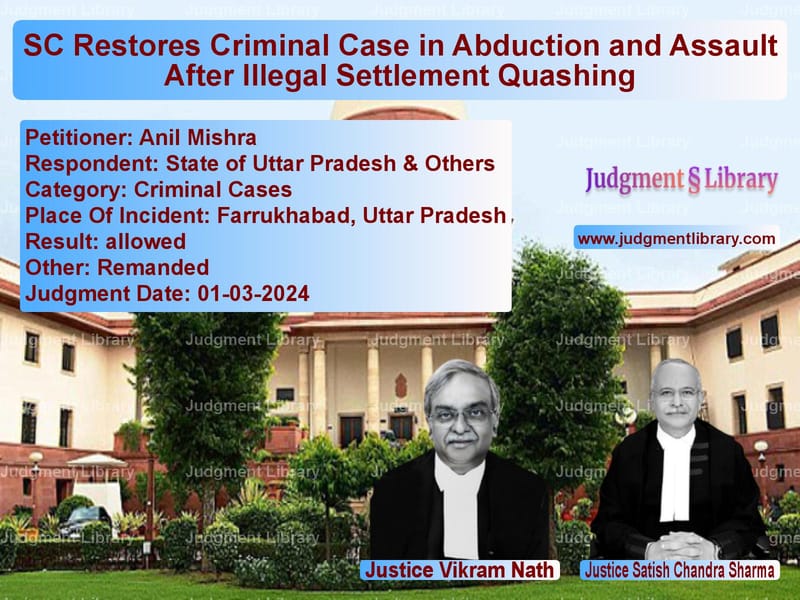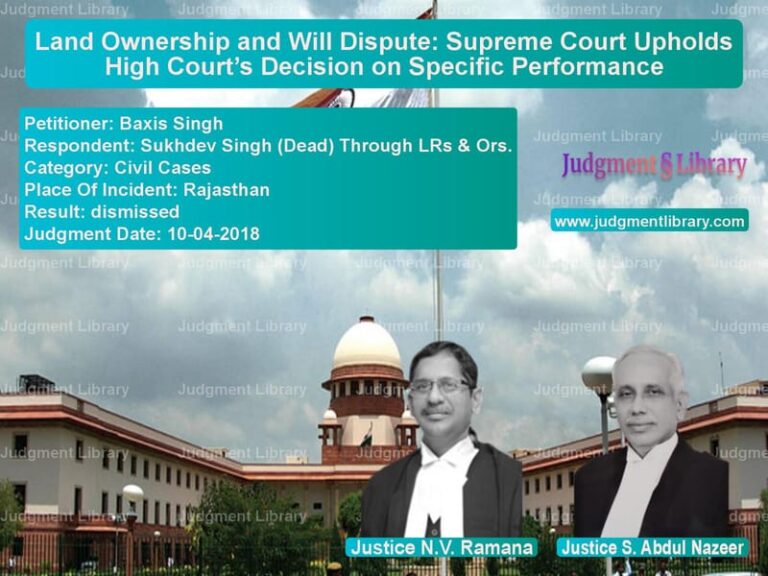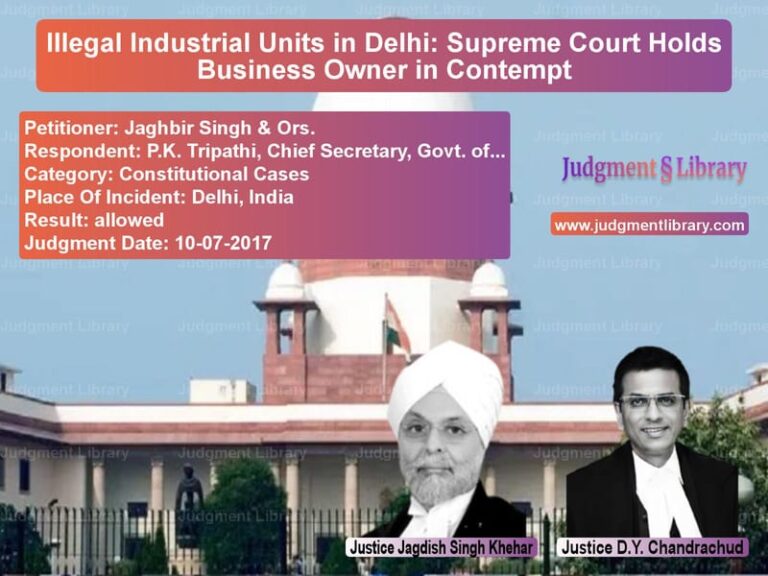SC Restores Criminal Case in Abduction and Assault After Illegal Settlement Quashing
The Supreme Court of India recently overturned a High Court order that had quashed a long-standing criminal case related to abduction and assault due to a settlement agreement. The case, Anil Mishra vs. State of Uttar Pradesh & Others, involved allegations of armed assault, abduction, and bodily harm filed in 1999. The Apex Court ruled that the settlement agreement was invalid because the original complainant, who was an injured victim, was not a party to it. The judgment reinforces the principle that serious criminal cases cannot be quashed merely on the basis of private settlements.
Background of the Case
The case originated from an FIR lodged on August 7, 1999, under Sections 364, 147, 148, 149, and 323 IPC. The complainant, Anil Mishra, alleged:
- He and another individual (Respondent No. 5) were attacked by a group of armed men wielding guns, rifles, and pistols.
- Both were severely beaten and injured.
- Respondent No. 5 was forcibly abducted by the accused.
Following police investigation, a charge sheet was filed against the accused persons. The trial court took cognizance of the case and issued summons to the accused in 1999 and 2000.
Legal History and Dispute
1. Initial Attempts to Quash the Case
The accused attempted to have the proceedings quashed by:
- Filing a criminal revision petition against the summoning order.
- Filing an application under Section 482 CrPC seeking quashing of the charge sheet.
Both were dismissed by the Allahabad High Court on May 28, 2010.
2. Settlement Agreement Introduced
In September 2022, the accused produced a settlement agreement between themselves and Respondent No. 5 (the abducted victim). Based on this, they filed another Section 482 CrPC application before the High Court, seeking to quash the case.
3. Trial Court Rejects Settlement
The trial court examined the settlement and ruled on January 23, 2023 that:
- The case involved non-compoundable offenses (364 IPC – abduction and 147 IPC – rioting).
- The original complainant, Anil Mishra, was not a party to the settlement and had opposed it.
- Since the settlement did not involve all victims, the case could not be quashed.
4. High Court Quashes the Case
Despite this, the accused filed another 482 CrPC application, which was allowed by the High Court on April 6, 2023. The High Court ruled:
“Since the abducted victim has settled the matter, there is no need to continue the criminal proceedings.”
Following this, Anil Mishra, the original complainant and injured victim, approached the Supreme Court.
Supreme Court’s Observations
1. Affected Victims Must Be Party to Settlements
The Court ruled that since Anil Mishra, an injured victim and the complainant, was not a party to the settlement, it could not be the sole basis for quashing the case:
“A criminal case cannot be quashed merely because one victim settles while another, who suffered direct harm, opposes the settlement.”
2. Non-Compoundable Offenses Cannot Be Settled Privately
The Court cited its landmark ruling in Gian Singh v. State of Punjab (2012), stating:
“Heinous crimes like abduction and grievous injury, which affect public order, cannot be settled privately. The power under Section 482 CrPC must be exercised carefully, ensuring justice is served.”
3. Misuse of Section 482 CrPC
The Court held that the High Court misapplied its jurisdiction under Section 482 CrPC:
“The High Court erred by failing to consider that the complainant was opposed to the settlement and that the offenses were non-compoundable.”
Final Verdict
The Supreme Court ruled:
- The High Court’s April 6, 2023 order was set aside.
- The criminal proceedings were restored in the trial court.
- The trial court was directed to expedite the trial and conclude it within one year.
Key Takeaways
- Settlement agreements cannot override justice: If a crime affects multiple victims, all must be part of the settlement.
- Non-compoundable offenses require judicial scrutiny: Cases involving serious crimes cannot be privately resolved.
- High Courts must carefully apply Section 482 CrPC: The power to quash cases should be used only to prevent injustice, not to bypass legal trials.
- Victims’ rights take priority: Courts must ensure that all affected individuals consent to settlements before dismissing cases.
This ruling underscores the importance of due process in criminal cases and ensures that victims’ voices are heard in the justice system.
Petitioner Name: Anil Mishra.Respondent Name: State of Uttar Pradesh & Others.Judgment By: Justice Vikram Nath, Justice Satish Chandra Sharma.Place Of Incident: Farrukhabad, Uttar Pradesh.Judgment Date: 01-03-2024.
Don’t miss out on the full details! Download the complete judgment in PDF format below and gain valuable insights instantly!
Download Judgment: anil-mishra-vs-state-of-uttar-prade-supreme-court-of-india-judgment-dated-01-03-2024.pdf
Directly Download Judgment: Directly download this Judgment
See all petitions in Attempt to Murder Cases
See all petitions in Theft and Robbery Cases
See all petitions in Judgment by Vikram Nath
See all petitions in Judgment by Satish Chandra Sharma
See all petitions in allowed
See all petitions in Remanded
See all petitions in supreme court of India judgments March 2024
See all petitions in 2024 judgments
See all posts in Criminal Cases Category
See all allowed petitions in Criminal Cases Category
See all Dismissed petitions in Criminal Cases Category
See all partially allowed petitions in Criminal Cases Category







